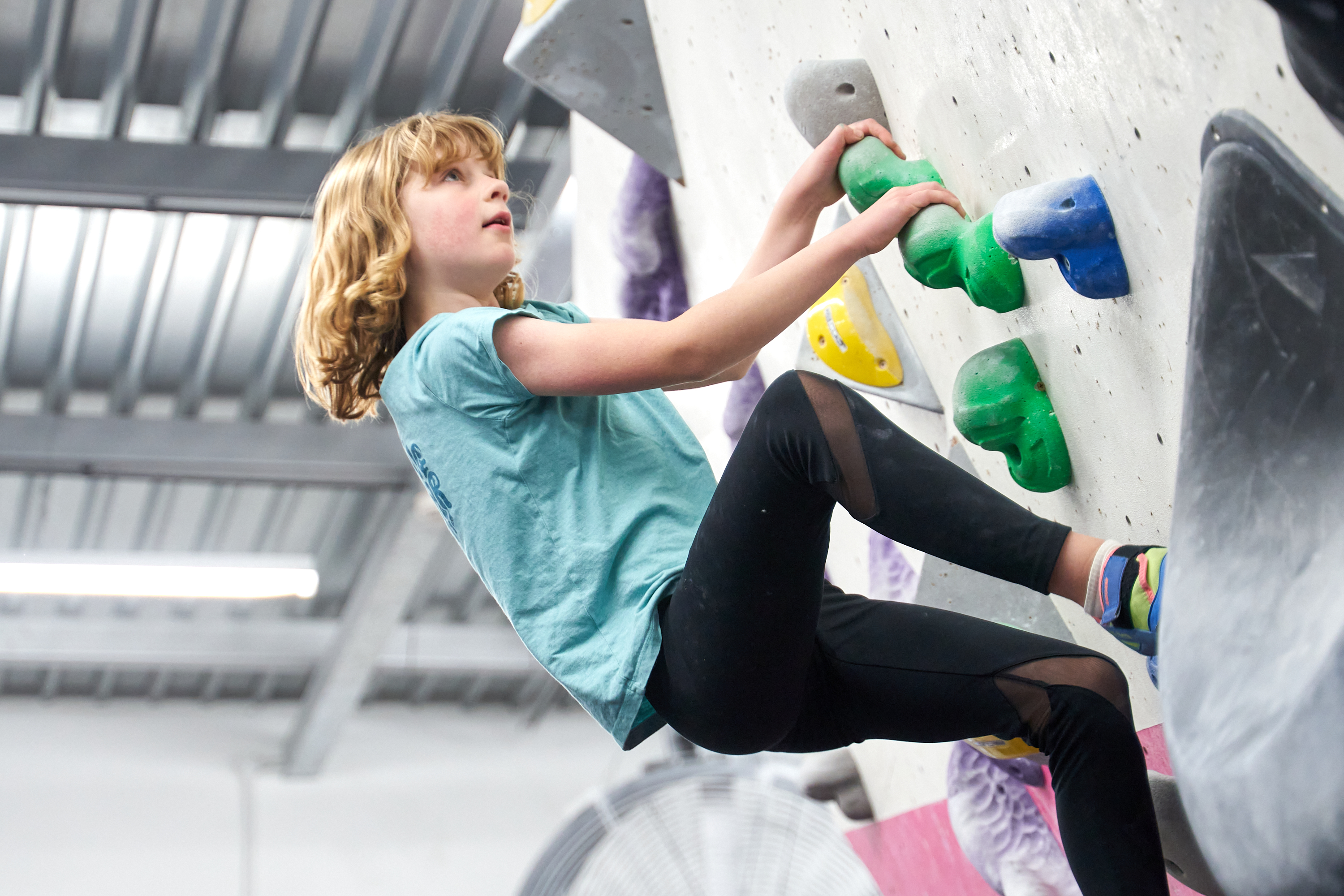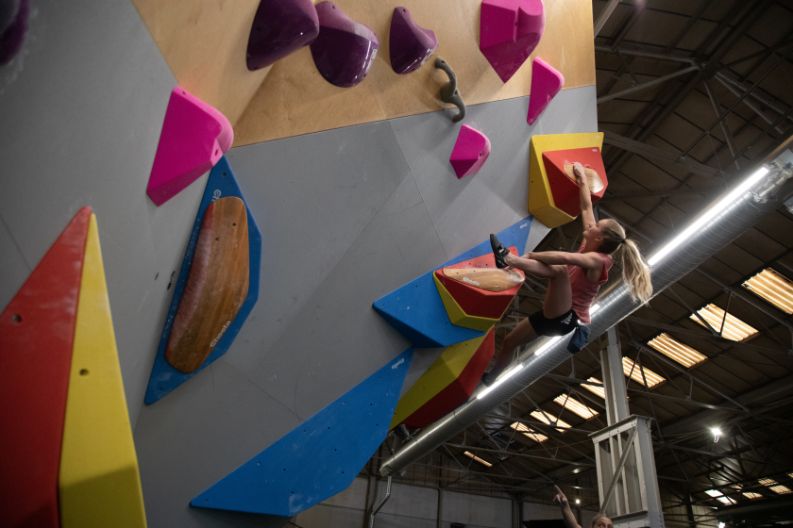In this blog, I’ll outline the typical pathway a young climber might take on their journey from beginner to Olympian.
1. Give It a Go!
The first and most crucial step in becoming a world-class climber is simply giving climbing a try and, most importantly, have fun! I recommend joining a kids' class like Rock Club. It's the perfect environment to make friends, enjoy the sport, and pick up some basic coaching tips. I began taking kids' classes when I was eight and continued in them for a couple of years. Even now, when I return home, I still bump into my first instructors, which always brings back good memories.

A young climber gets to grips with the wall.
2. Start Competing
Once you’ve got the basics down, why not try your hand at competition climbing? The Youth Climbing Series (YCS) is an excellent place to start. YCS caters to all levels, from beginner to pre-international, with regional rounds in both lead/top-rope and bouldering, culminating in a combined National Final for the top competitors. The event is divided into five age categories, ranging from ages 7 to 17. I started competing in YCS when I was ten, and it took me three years to qualify for the national final, so don’t be disheartened if you’re not winning right away!
Local climbing walls often host fun competitions like the Summer or Winter Bouldering Leagues. These events are great for building resilience and gaining competition experience, even if they aren't always tailored specifically for children.
Next month, The Climbing Hangar will host 'The Hangar Games', which isn't really just a comp, but a major youth climbing event. It's the perfect place to gain competition climbing experience, learn more about the pathway to pro and hang out with seasoned pro's, qualified coaches and other young climbing hopefuls.
3. Join a Competition Squad & Get a Coach
The Hangar Games allows me to neatly segue into climbing squads, because the comp is attending by youth climbing squads from The Climbing Hangar and also other gyms around the UK.
If you discover that you love competing and want to take it more seriously, the next step is to join a local competition squad. These teams often have trials, but the coaches are usually more interested in your attitude than your ability. When I joined my local youth squad at age eleven, I couldn’t do a pull-up and my climbing ability wasn’t outstanding either. But I was always eager to try hard and give it my best effort so I was selected for the team! In the competition squad, coaching becomes more advanced, teaching you how to become an independent and skilled climber. Plus, you’ll make lifelong friends—another big perk.
If possible, you should also find a coach for one-on-one sessions. This could be someone from your team or elsewhere. A coach is essential for helping you set goals, refine your technique, and create a training plan to achieve your potential.

A Hangar Squad climber attempts a competition bloc under the watchful eye of Head Coach Sam Owens.
4. Try Out for the Regional or National Team
The next step is to enter the GB Climbing Pathway, starting with the England Regional Talent Squad or the Scotland Development Squad. After this, you can aim for the England and Scotland Talent Squads. Qualification routes for these teams vary yearly but usually involve national competitions and an application process. Keep up with the latest qualifications here.
Being part of these teams grants access to coaching camps with the GB coaches and the opportunity to meet other strong climbers your age. Alongside being in these squads, you should try your hand at higher-level national competitions like the Junior British Championships. Some climbers choose to compete in open international event, but I didn’t, and I don’t feel like I missed out on any key development. A bit of advice for parents: make sure your child doesn’t burn out—climbing should always be fun not stressful.
5. Join the GB Junior Team
The next big step is qualifying for the GB Junior Team, which allows you to compete in IFSC Youth events. Along with support from your home coaches, you’ll also receive guidance from GB Climbing staff. It’s a big leap to go from the National Squads to the Team, and hard work and dedication is what will get you there. Setbacks are normal, but with consistency and resilience you can achieve your goals.

Louise Flockhart is a regular on the national and internation competition circuit.
6. GB Senior Team
If you excel on the junior circuit, you will get the chance to compete in senior events like European Cups. Do well at these events and you’ll progress to World Cup participation. By this point, your whole life is probably climbing, and you don’t need advice from a blog on how to get to the Olympics!
7. The Olympics
If you make it here, you've reached the pinnacle of competition climbing! Only the top 20 male and female athletes worldwide qualify, and even fewer secure a spot on the podium. Reflect on the many small steps that cumulatively have brought you to this incredible achievement!

Shauna Coxsey was the first climber to represent Team GB at The Olympic Games in Tokyo 2020
Final Thoughts
The journey from beginner to Olympian is a long one, full of challenges and setbacks. Injuries, exams, and changes in circumstances can all create obstacles. The most important thing is to have fun, but with dedication, passion, and a bit of luck, you might just find yourself standing on the Olympic podium one day!
